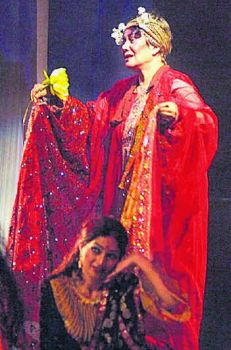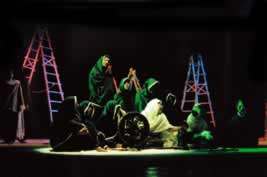NATI BINODINI steals the show at Bharat Rang Mahotsav
Nati Binodini, presented at Kamani in January 2008 in the NSD Theatre Utsav 2008 by Theatre and Television Associates, New Delhi, Directed by Amal Allana received a standing ovation and was one of the landmark plays of the fest along with Kewal Dahliwal’s Yatra. Girish Ghosh, Binodini’s Mentor and Theatre Director was brilliantly portrayed by Jayanto Das with his earthy and authentic performance style. The performance of the protogonist was rendered simultaneously by five actresses: Salima Raza, Swaroopa Ghosh, Natasha Rastogi, Sonam Kalra and Amita Ailawadi. Each one of them represented different ages and stages of the Nati’s life. Salima Raza enthralled the audience with her virtuoso performance and her remarkable stage presence. Nissar Allana’s Moving Venetian Blind style of backdrops with projected images and Glass floor gave the production a kind of slickness that only Nissar can create.
The play opens with the five actresses dressed in white hooded sarees creating a remarkable visual composition. The actresses one by one unfold the multilayered and colored identity of Binodini orchestrated by appropriately dramatic music composed by Devajit Bandyopadhyay. A take-off from Binodini Dasi’s (1863-1942) autobiography, the play seeks to interrogate and problematize the layered and complex existence of the immensely talented actresses, virtuoso performers in their own right, in nineteenth century Bengali theatre—an existence where their social and economic insecurity became a handle for exploitation by a whole section of the nouveau riche dandified gentry on the one hand, and the mentor-director-playwright-manager of the theatre, on the other. The action is divided into ten sequences, with the ageing Binodini as the Narrator addressing Girish Ghosh and recounting the story of her life, through all its losses and hurts, and its occasional moments of hope and joy. The play ends with an Epilogue where Binodini makes up an uneasy truce with life that had not been very kind to her.
The script jointly deviced by Amal and Salima depicts two journeys—one, that of ‘becoming’ the actress, and the other, the writing of her autobiography, shifting constantly between construction and deconstruction of the dimensions of the persona. Binodini requested Girish Ghosh to write the preface to her book, because she needed the ‘father’ of theatre in Bengal to authenticate the document. He hesitated, declined, then wrote a sort of a condescending apologia. Structurally, the narrative does not follow any time sequence, but there is an overwhelming sense of skepticism about life, humanity and the Almighty.


